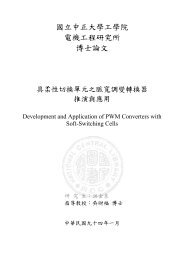Syntax of the Bi Comparative Construction in Mandarin Chinese
Syntax of the Bi Comparative Construction in Mandarin Chinese
Syntax of the Bi Comparative Construction in Mandarin Chinese
You also want an ePaper? Increase the reach of your titles
YUMPU automatically turns print PDFs into web optimized ePapers that Google loves.
<strong>Syntax</strong> <strong>of</strong> <strong>the</strong> <strong>Bi</strong> <strong>Comparative</strong> <strong>Construction</strong> <strong>in</strong> Mandar<strong>in</strong> Ch<strong>in</strong>ese<br />
(103) a. wo-de shu [bi ni-de ___ ] (geng) gui<br />
I-OBL book COM you-OBL more expensive<br />
‘My books are more expensive than yours.’<br />
b. ta [bi ni ___ ] (geng) gao<br />
3sg COM you more tall<br />
‘S/He is taller than you are.’<br />
c. ta [bi ni ___ ] (geng) xihuan shu<br />
3sg COM you more like book<br />
‘S/He likes books more than you do.’<br />
3.3.1 A Default <strong>Comparative</strong> Degree on <strong>the</strong> Gradable Predicate/Proposition<br />
Chang (2004) addresses a semantic requirement between adjective predicates<br />
and adverbial modifiers. Chang expla<strong>in</strong>s that <strong>the</strong> structure <strong>of</strong> scales (Kennedy and<br />
McNally 2002) entail<strong>in</strong>g gradability 14 (Sapir 1944,Bol<strong>in</strong>ger 1972) plays an important<br />
role <strong>in</strong> grammaticality when adjective predicates and adverbial modifiers co-occur.<br />
Accord<strong>in</strong>g to Sapir (1944) and Bol<strong>in</strong>ger (1972), gradability is a property not just <strong>of</strong><br />
adjectives (104), but also <strong>of</strong> verbs (105), adverbs and even nouns (106). Adverb hen<br />
makes <strong>the</strong> nouns manifest <strong>the</strong> property <strong>of</strong> adjectives and makes both <strong>of</strong> <strong>the</strong>m become<br />
gradable predicates, however its mean<strong>in</strong>g <strong>of</strong> ‘very’ is gett<strong>in</strong>g blurred <strong>in</strong> both cases.<br />
(104) a. zhe-duo hua *(hen/feichang) da/xiao<br />
this-CL flower very big/little<br />
‘This flower is *(very) big/ little.’<br />
14 Sapir (1949:123): Every quantifiable, where existent (say “house”) or occurrent (say “run”) or<br />
quality <strong>of</strong> existent (say “red”) or quality <strong>of</strong> occurrent (say “gracefully”) is <strong>in</strong>tr<strong>in</strong>sically gradable.<br />
62<br />
中正大學 e-Thesys (94 學年度)





